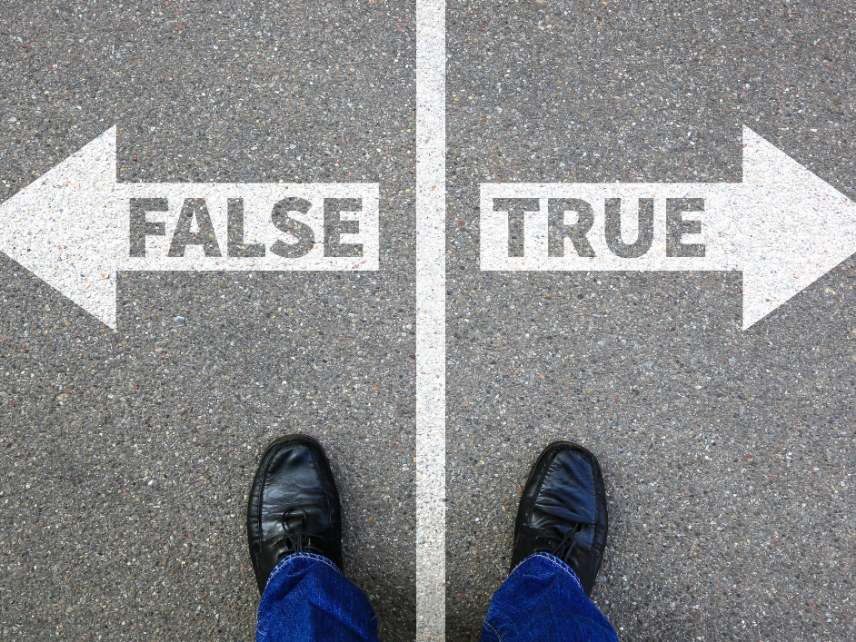How to Sniff Out Fake News
You don't need (and definitely do not want) the government to serve as a lie detector.

Say you're a person of average intelligence (or higher) who likes to keep abreast of the news and who therefore follows several sources of it. Lately you've seen a number of people, not least among them the president of the United States, screaming about Fake News. You may well be wondering how, in the current fractured media landscape, you're supposed to discern who is telling the truth, who is lying—and who is telling the truth or lying about who is telling the truth. What is to be done?
Here's one thing that is emphatically not to be done: Emulate Malaysia, which has just outlawed "fake news" and authorized prison terms of up to six years for so-called offenders. If there's anything worse than having giant news corporations, social-media censors, and search-engine algorithms decide what you can and cannot see, it's having the government make that decision.
Besides: Teasing out the true from the false is really not so hard. A few tips:
(1) Know the source. Say what you will about media bias—and there will be more to say in a few paragraphs—established media organizations work hard to get their facts right. They hate—hate, hate, hate—getting the story wrong.
Some do, sometimes. Sometimes they get badly burned. Janet Cooke at The Washington Post won a Pulitzer for a fabricated story about an 8-year-old heroin addict. Jayson Blair at The New York Times plagiarized and fabricated stories. There have been other instances. But here's the thing: After each of these scandals, the news organizations made very public, excruciatingly detailed confessions laying out their own mistakes. Sketchy outlets never even correct minor mistakes, let alone big ones.
That doesn't mean traditional media should automatically be believed about everything. It does make them more believable than some random website you stumble across on the internet.
(2) Check the sources. Good news media cite them: A story on the federal deficit, for instance, will cite and perhaps link to the Congressional Budget Office. A story on highway fatalities might cite the Insurance Institute for Highway Safety. If you see a story about a study purporting to find no link between drunk driving and highway deaths, you might want to know whether it came from the Centers for Disease Control or, say, the Distilled Spirits Council of America.
(3) Investigate. If a Facebook post claims scientists in Atlantis have invented a perpetual-motion machine, look it up. And here's a pro tip: Don't just Google it. Confine your search to a reputable source of information by using the search term "site:"—as in, "site:scientificamerican.com" or site:theatlantic.com. (This is also a good way to frustrate search algorithms that clutter your results with ads.)
(4) Read both sides. News sources aren't the only ones that are biased. So are consumers. (Insert shocked face here.) Example: A Gallup-Knight Foundation survey recently found that 42 percent of Republicans, and 17 percent of Democrats, consider accurate but unflattering articles "fake news." This is a classic case of confirmation bias: the tendency to reject information that challenges our established beliefs.
Some media have built entire business models around catering to partisan bias (here's looking at you, Fox and MSNBC). This means that while they will not knowingly report anything false, they will leave out a great deal that is true.
For instance, shortly after Donald Trump was inaugurated, The New York Times ran a series of prominent stories about the desecration of Jewish cemeteries, linking them to the political tenor of the day. But as Commentary's Seth Mandel, Algemeiner's Ira Stoll, and others pointed out, the desecration of Jewish cemeteries is nothing new. Yet The Times largely ignored or downplayed it until January, 2017—leaving the dangerous impression that anti-Semitism is contingent on U.S. presidential politics, rather than a persistent virulence unto its own vile self.
5) Don't be paranoid. Watch out for "news" sources that claim they are telling you secrets "the media don't want you to know." Respectable news outlets almost never sit on a big story; breaking big news is their reason for existing. If none of the major news outlets has reported that the president is actually a space alien, it's probably because he is not a space alien.
6) Watch out for bias. It is not true that the media are "out to get" one side or the other. The reality is actually worse: Many in the media have no clue just how biased they really are. Newsroom stylebooks don't dictate that reporters refer routinely to "the gun lobby" but never to "the abortion lobby," for example. Newsrooms just tend to have far more sympathy for the latter than the former. Likewise, they tend to be far more interested in fearmongering stories about the harm from too little regulation than from too much of it.
Sometimes the bias is toward the sensational. (Insert shocked face again.) E.g., it's much more dramatic to write a story about mortgage discrimination that begins, "Redheads are rejected for bank loans four times as often as blondes are" than one that begins, "Redheads are approved for bank loans 96 percent of the time, compared to 99 percent of the time for blondes."
Finally, watch out for fearmongering about fake news itself. There's little evidence that, say, the bogus story about the Pope endorsing Trump for president swayed any votes. Which isn't to say that we needn't concern ourselves with the truth at all. As Yale professor Timothy Snyder put it so well in his book on tyranny, "To abandon facts is to abandon freedom. If nothing is true, then no one can criticize power, because there is no basis upon which to do so."


Show Comments (111)